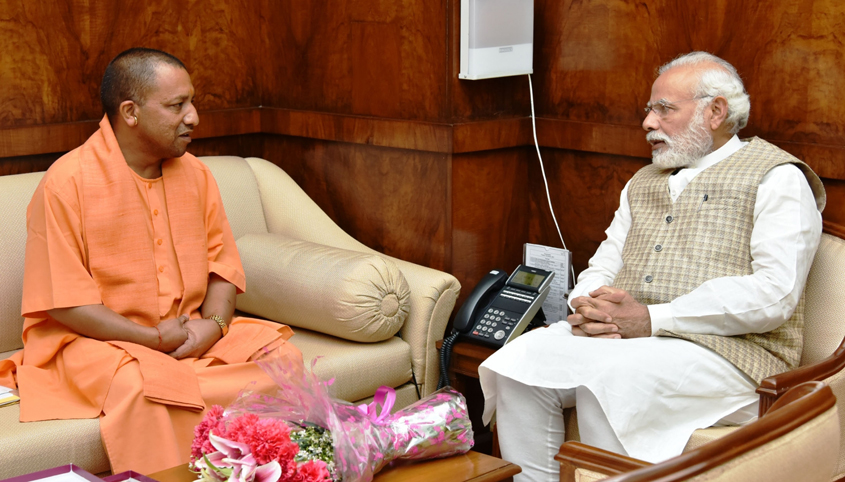The astute Prime Minister has started this exercise from states where after leading the party to impressive victories, he has encouraged a new set of leaders to take over. In UP, Adityanath’s choice reiterates the assumption that Modi has the twin objective of consolidating the BJP’s position nation-wide, while simultaneously having his hand-picked nominees as Chief Ministers of states.
Earlier, he played a stellar role in making Manohar Lal Khattar the Chief Minister of Haryana; Raghubar Das, the head of government in Jharkhand; Devendra Fadnavis, the boss of Maharashtra; Sarbananda Sonowal, Assam’s top functionary; and Trivendra Singh Rawat, Uttarakhand’s new leader. Similarly, N. Biren Singh assumed the top office in Manipur and Vijay Rupani was chosen to lead Gujarat. Manohar Parrikar’s return to Goa gives ample evidence regarding the importance the Prime Minister attaches to the states. He consciously opted to relieve his well performing Defence Minister to return and strengthen the party.
There is ample speculation in political circles that the three long-serving Chief Ministers of Rajasthan, Madhya Pradesh and Chhattisgarh may be inducted in the Union Cabinet to pave the way for new leaders in the three states that go to the polls in 2018. In case of the likelihood of such a scenario, it would only reveal that the Prime Minister wishes to bring in fresh faces to diminish anti incumbency, thereby sending an outspoken signal that the new nominees were of his picking. This would help in enhancing the morale of workers to make them prepared for the 2019 Parliamentary polls as well.
Adityanath’s appointment as Chief Minister provides an insight into the working of the Prime Minister’s mind. PM Modi has always been a firm believer that the party organisation was pivotal, yet it should not come in the way of administration and governance. In Gujarat as Chief Minister, he ensured that the interference from the Sangh Parivar was minimal and he did not hesitate in marginalising Hindu leaders such as Pravin Togadia and Sanjay Joshi.
It appears that he is looking at Uttar Pradesh through the prism of his own experience and thus wanted the preferred nominee of the MLAs, Yogi Adityanath in the hot seat. UP needs some harsh measures and only a CM who is dead-honest and is not under anyone’s undue influence could work towards making the state far better than what it has been in the last so many decades. The Yogi is a five-time BJP MP, but in no manner has been with the Rashtriya Swayamsevak Sangh or under its influence.
He, in his own right, is a Hindu leader and would not be susceptible to any kind of pressure from the Sangh or its affiliates. Knowing that party representatives would make all kinds of demands, the Prime Minister, by addressing the issue with BJP MPs, sent an outright message down the line that no one should press the Chief Minister for any favours. He has provided a protective ring around the Yogi to ensure that he is left alone by elements in his own party known for their machinations of intrigue and conspiracies.
If stories circulating in the BJP’s circles are to be believed, there was an attempt to prevent Adityanath from taking over. A powerful section was rooting for Manoj Sinha, a prominent Bhumihar leader and a Minister of State in the Central government. A segment of the RSS wanted to send Rajnath Singh to UP as the CM. However, Modi was aware that the MLAs were in favour of Yogi Adityanath, who was non-aligned in the party’s politics and commanded immense respect, which was able to cut across caste lines. He summoned him to Delhi and also communicated to Keshav Prasad Maurya and Dinesh Sharma that they were to serve as the Yogi’s deputies. In one single stroke, Modi pre-empted attempts to override the wishes of the MLAs.
A denunciation of a majority of Modi’s nominees is that they have been inexperienced and therefore are unfit for the august office. The Prime Minister has always been of the opinion that experience was not necessary if the chosen leaders had the right intention, integrity and capacity to deliver. He himself was not even an MLA when he was chosen to replace Keshubhai Patel in Gujarat in October, 2001. He turned out to be Gujarat’s most eminent Chief Minister. Similarly, he had never delved in national politics and was not a member of either House before he was selected to lead the BJP campaign for the 2014 Parliamentary elections.
He not only led from the front but has emerged as the tallest leader in the country. Therefore, he feels that his selected bunch of Chief Ministers should not be short on plans and their implementation. Rest, all would fall in place. Politically speaking, having his own people in key positions would concurrently strengthen the Prime Minister, thus facilitating him to actualise his promises.
Yogi Adityanath and others were shortlisted to meet the objectives of the Prime Minister and thereby setting an example and standard for others in the party.

